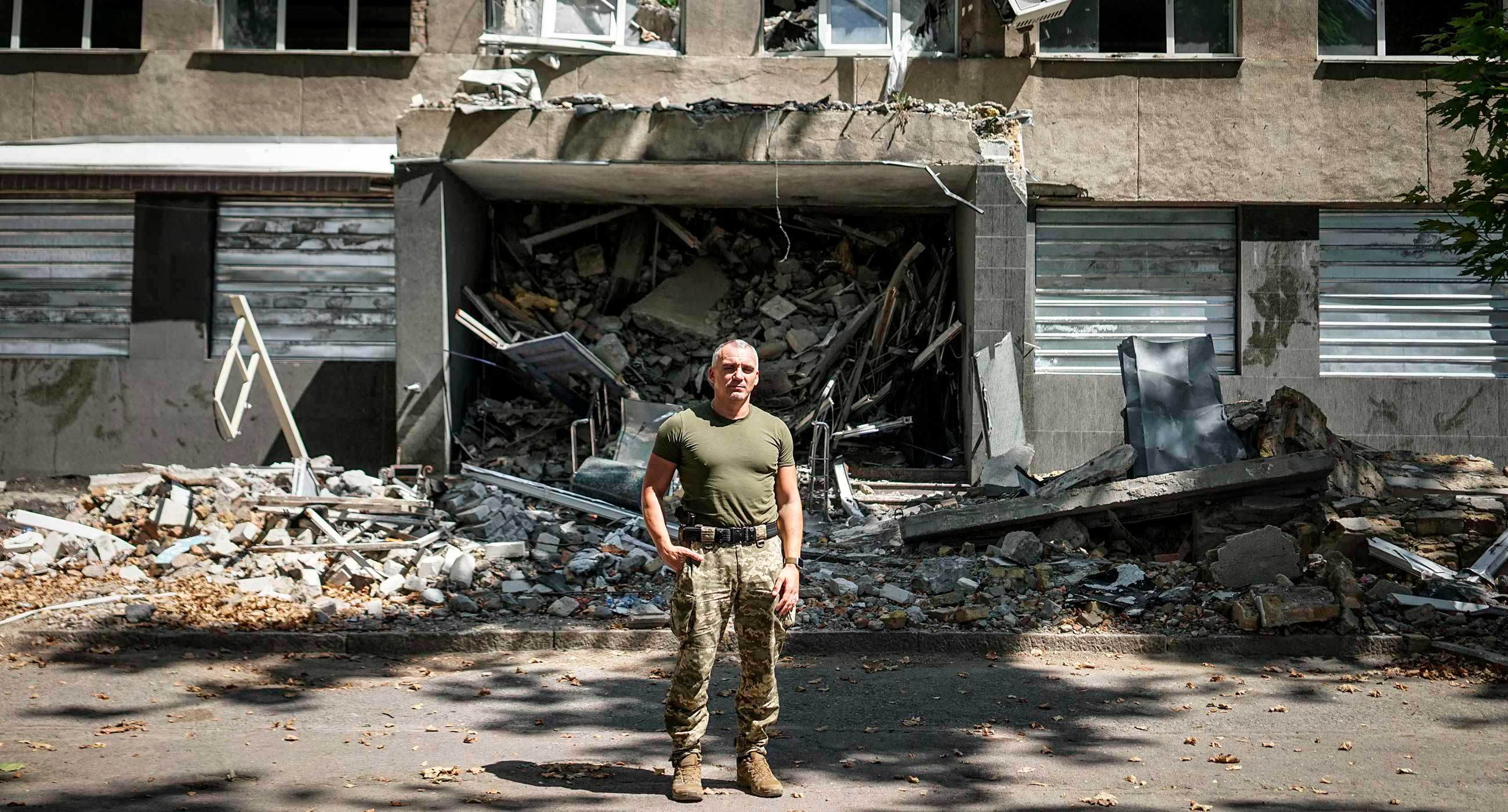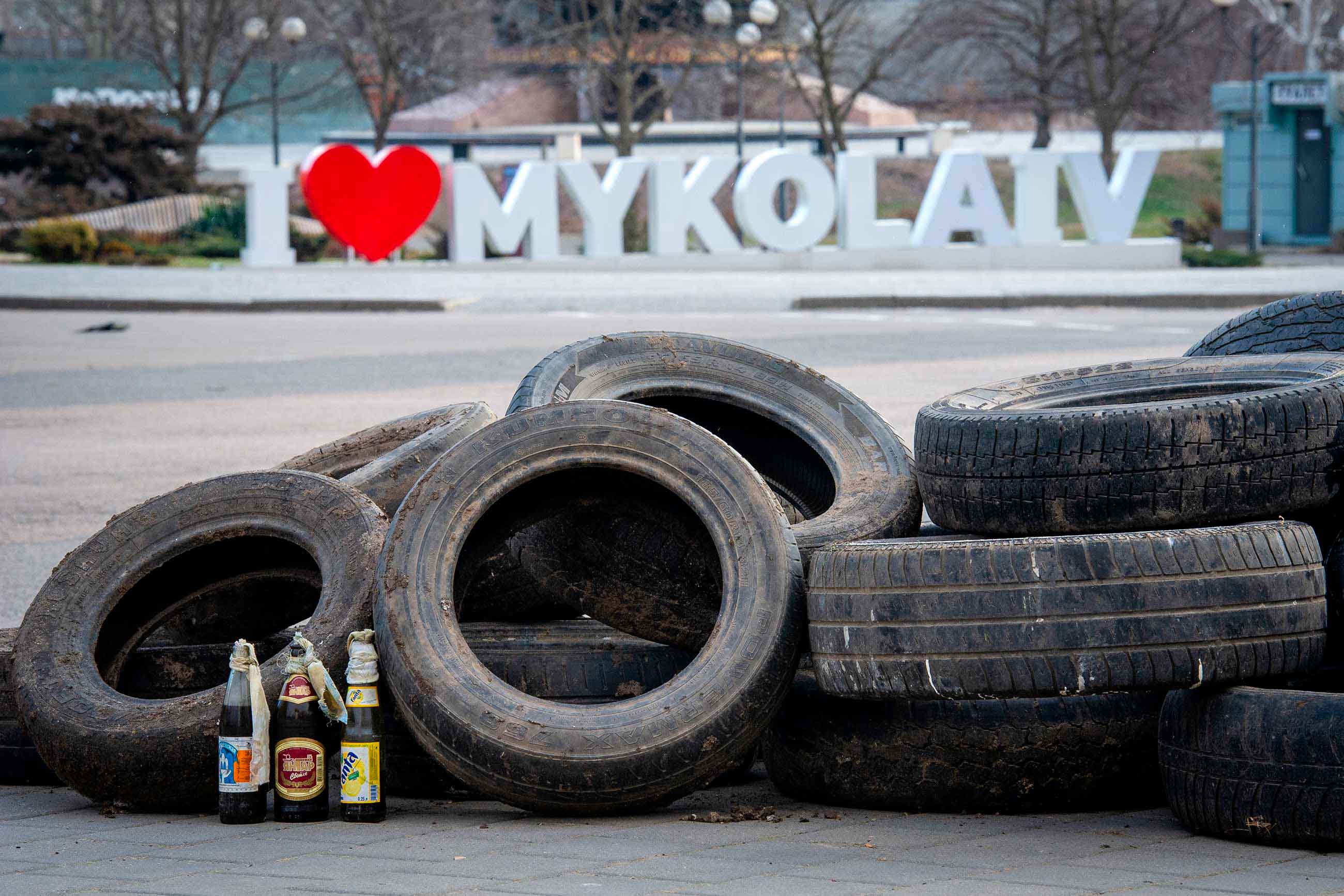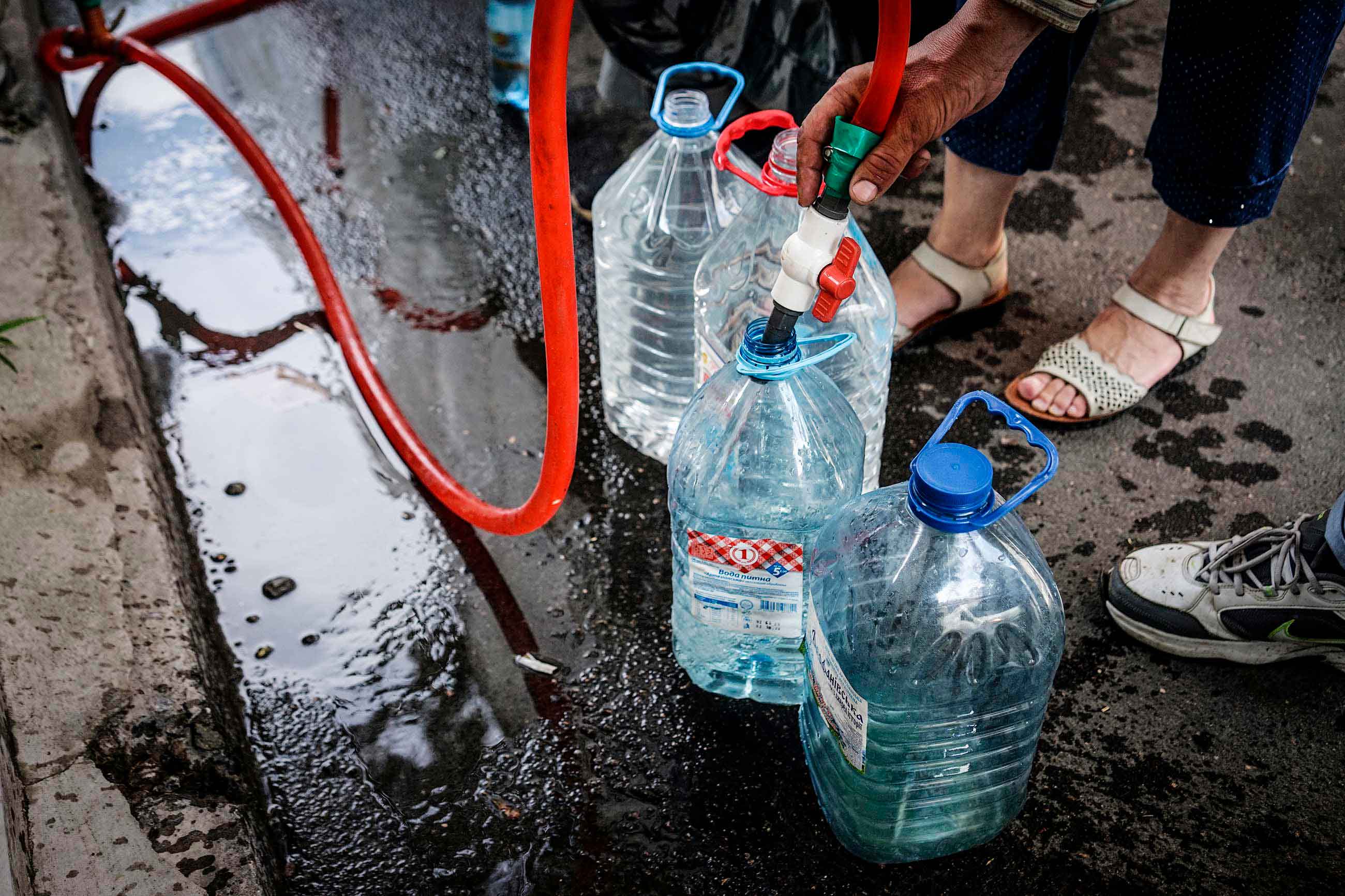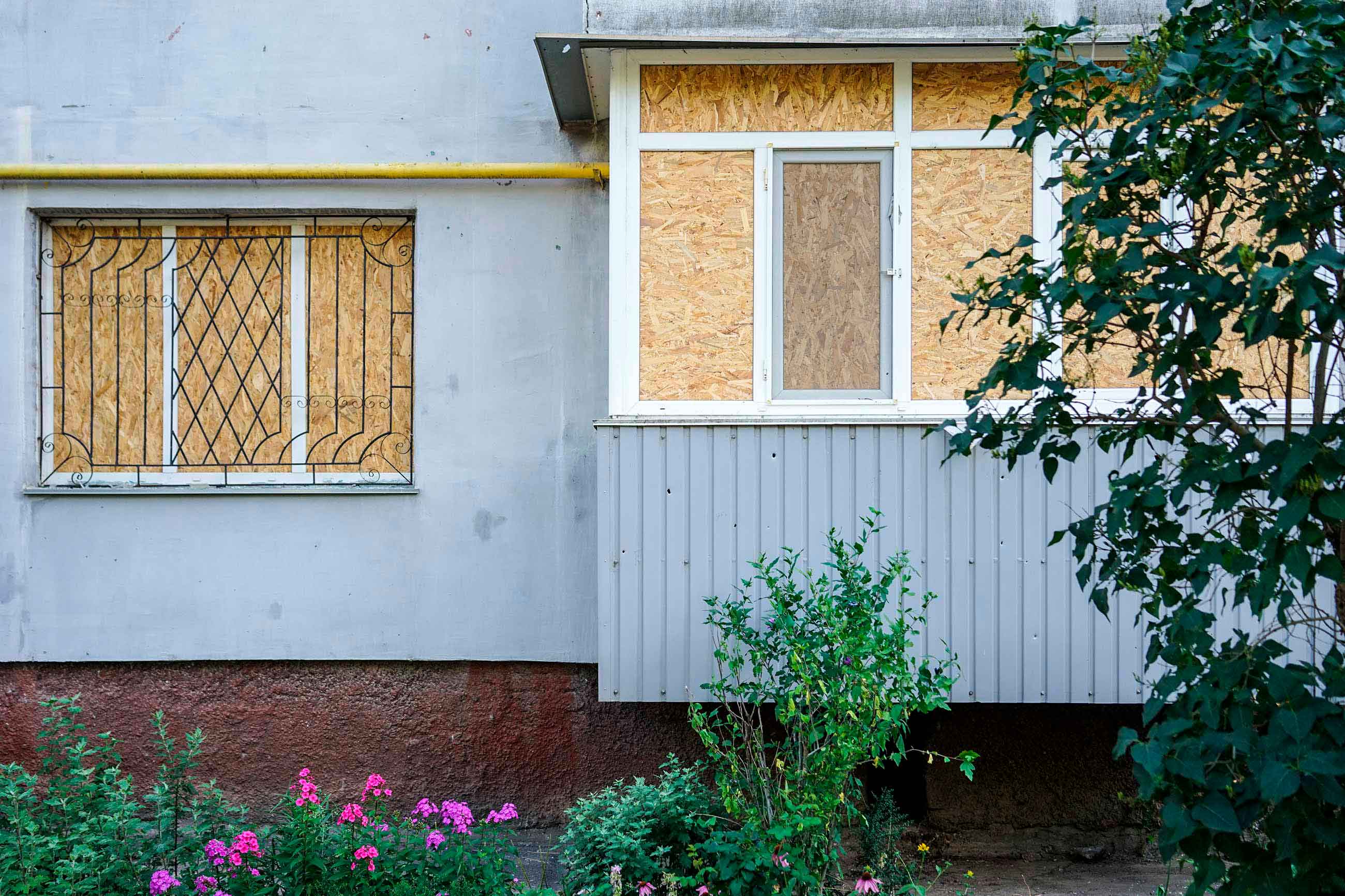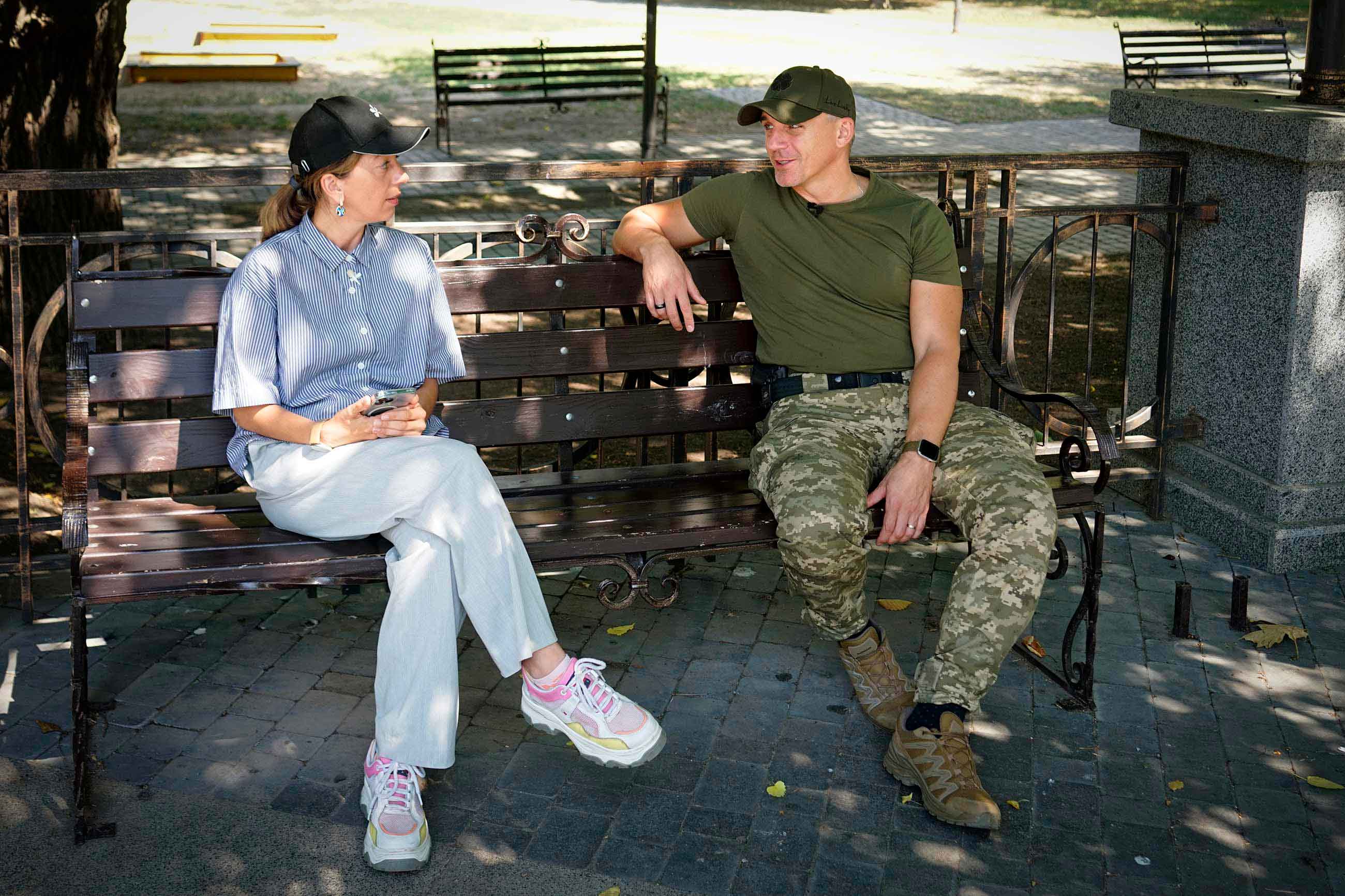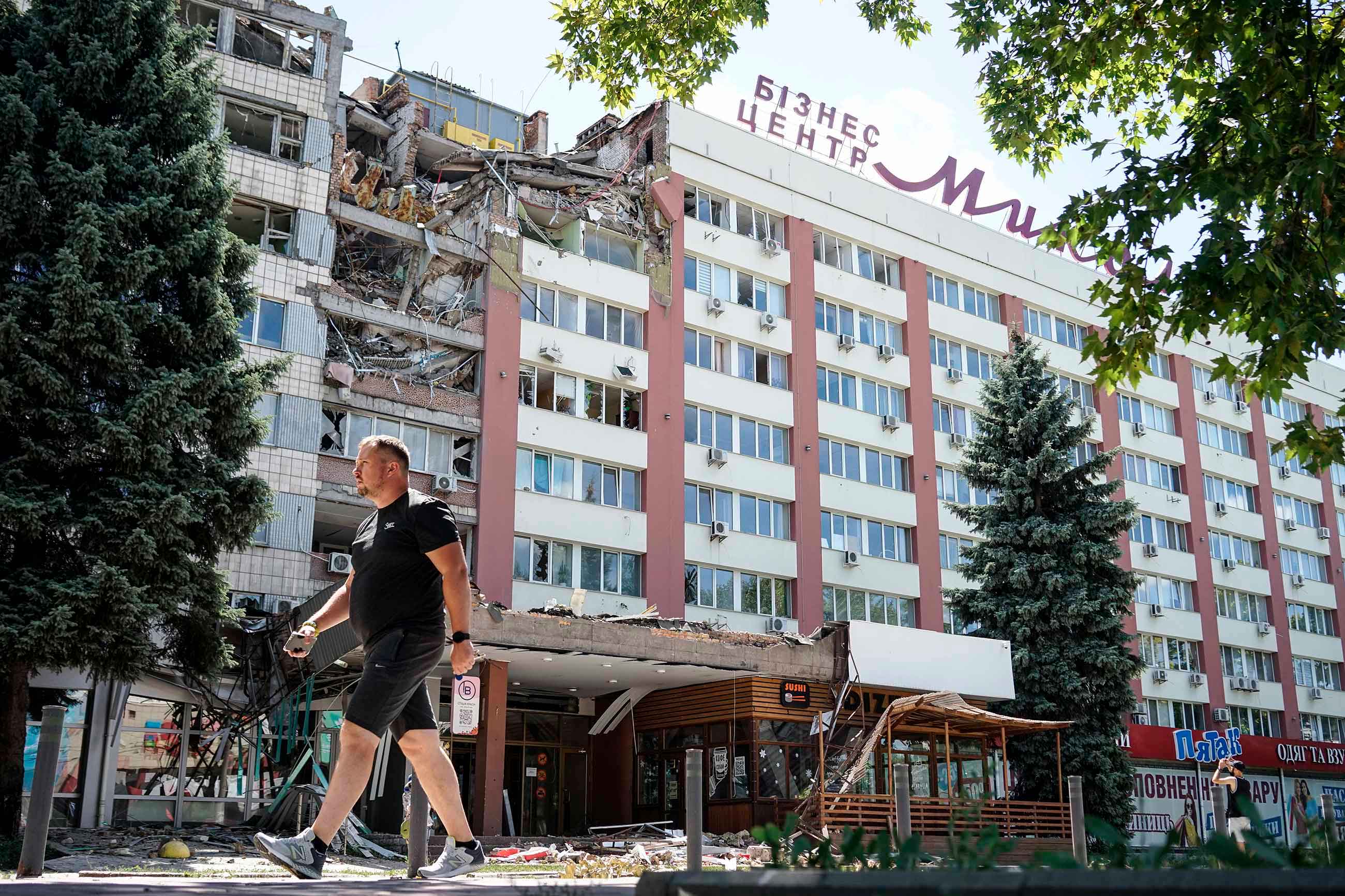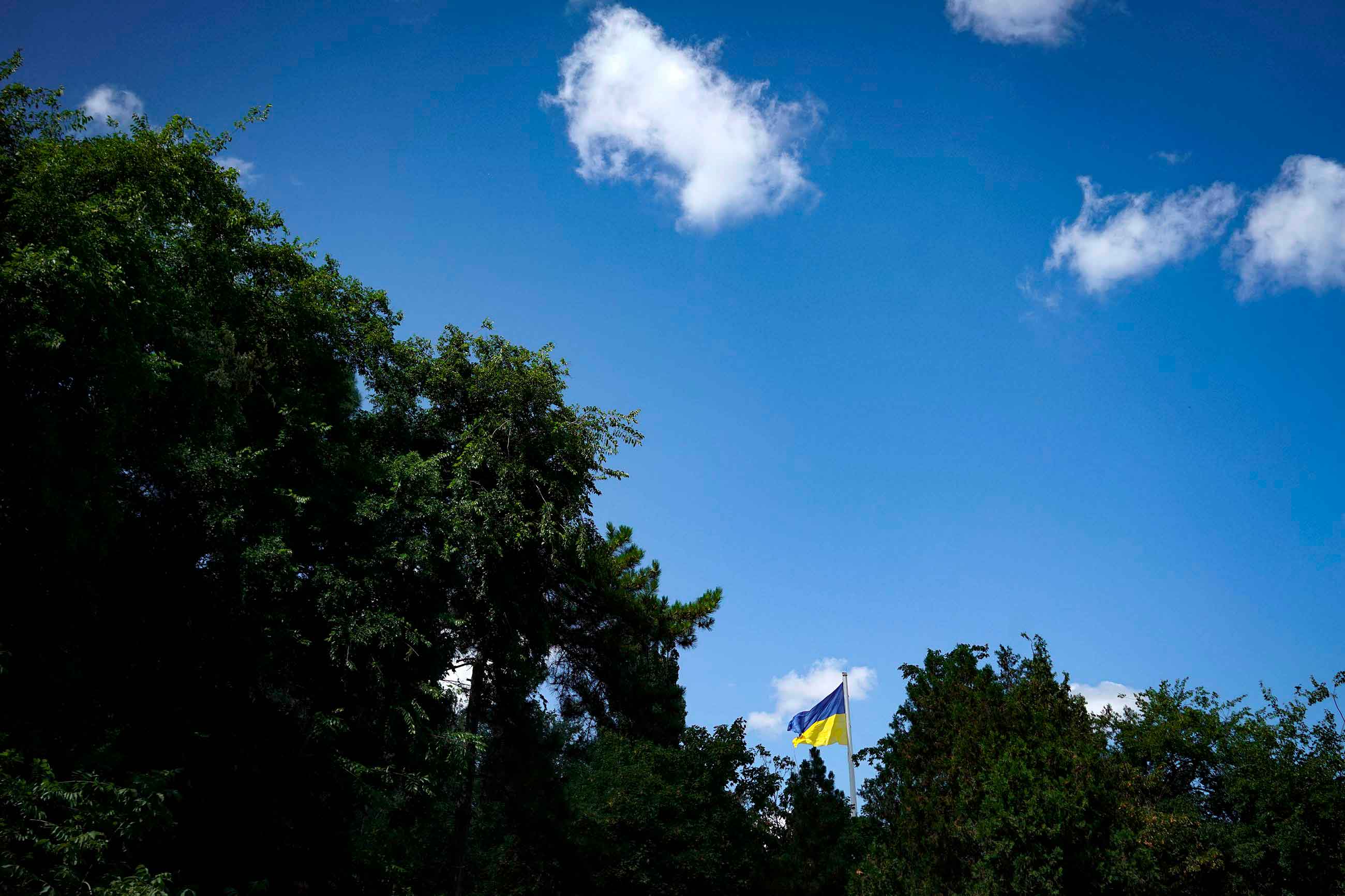Support Zaborona at this difficult time so that we can continue to inform you and record important stories.
Mykolaiv region is the third region in terms of shelling after the Luhansk and Donetsk regions; since the beginning of the invasion, Russia fired it upon approximately 700 times. In the regional center, part of the construction communications, infrastructure, and water supply were destroyed during half a year of the full-scale war. Zaborona’s editor-in-chief Kateryna Sergatskova met with the mayor Oleksandr Sienkevych in Mykolaiv to talk with him about whether it is possible to make plans for more than a week when you live in the front-line zone, about collaborators correcting enemy shots, and what problems the locals face.
You spend five months in the role of mayor of a wartime town. How does it feel?
There is no time to think about feelings. Since it all started, we immediately reoriented to the military style of managing everything. Currently, we do not have a permanent office or city council. We are all in different places.We gather constantly via the walkie-talkie.The chiefs of subdivisions work around the clock because there is shelling during the day and night. It is necessary to save people, their property and turn off gas and electricity. Therefore, there is no particular difference in the work of the mayor in emergency mode in a military city [compared to pre-war times]. Apart from one day is like another: we wait for the shelling and think about what to do next.
The second thing is that we do not make long-term plans: it doesn’t make sense to think of rebuilding or renewing something now. We will do it later.
So what does the planning horizon look like?
Now — no more than a week. We try not to think about what will happen after the end of the war. That’s later. You know, it’s like “after the holidays” — it’s the same as “after the war.”
At the beginning of the invasion, Russian troops were simply in the city.
Almost. They were in the suburbs.
What was the first thing you did when you found out that troops were entering Mykolaiv?
First, we got together and understood that we needed to prepare for an attack. Therefore, all utility companies that had heavy equipment, together with the military, began to build roadblocks, as was the case in 2014, as well as fortifications, bury military equipment, and prepare the city for a possible siege.
-

Blockpost in Mykolaiv, March 30, 2022. Photo: Scott Peterson / Getty Images
While the Russians came from the Kherson region and seized Kherson, we had time to prepare, deploy military units and, in synchronization with the military, build all the necessary minimal fortifications. After that, they prepared for the siege.
However, at the beginning of the war, the Russians had a different tactic. They marched in large columns, which allowed our artillery to work. Therefore, Russian troops suffered heavy losses. Moreover, they were attacking, not sitting in fortifications. We worked together with the military. In fact, we were a construction platoon. It is the first.
Secondly, we pulled out equipment that had broken: ours or those that had been abandoned by the Russians on the battlefield near the city. We took them out with tractors, trawlers and pulled out tanks, armored personnel carriers, MT-LB, cannonry, and howitzers. In total, up to 50 units of various Russian equipment were brought to the city and handed over to the military — either we fixed them by ourselves or gave them for repair.
How would you describe the situation in the city to a person who has not been to Mykolaiv all this time? How does the city live?
The city lives under constant shelling. Since the beginning of the full-scale invasion, we had not been bombed for 21 days. Today is the 152nd day of the war [the interview was recorded a few weeks ago, editor’s note]. So, out of 152 days, we were not bombed for 21 days. We count them.
First, they hit with cluster shells. Most of the missiles fired at Mykolaiv were cluster bombs: scattering blusted around, they killed people and damaged buildings but did not destroy them. Then the Russians used rocket salvo systems launched from the Kherson region: they were over Mykolaiv in 2 minutes. Later, they switched to Kalibr cruise missiles. Recently, there were modified S-300 systems which are usually constructed for damaging other types of objects, but now the Russian army is firing them at our ground targets.
What’s going on? From the first day, I have been repeating to all residents of Mykolaiv that they should leave the city, it is dangerous here. Many people say: “We cannot live without our beloved Mykolaiv. How can we be happy in other cities? It will be inconvenient. We don’t know where to go.” But I answer that it is better to be unhappy for a time but alive than happy but dead forever. People have the opportunity to return after the war and keep living a normal life. Now you have to remember: while you have problems like “where to live?” or don’t eat as usual — someone is in the trenches and is risking his life every second. Therefore, you should be patient.
-
The Military of the Armed Forces of Ukraine searches for the remains of one of the five missing soldiers that died as a result of a Russian missile attack on the headquarters of the 79th Brigade of the Armed Forces of Ukraine in the strategic port city of Mykolaiv, Ukraine, on March 10, 2022. Ukrainian forces repulsed several concerted ground attacks, while Russian forces advanced northwest from Crimea and through Kherson and launched frequent rocket and missile strikes on the city. Photo: Scott Peterson / Getty Images
In Mykolaiv, after every shelling, our communal services restore the infrastructure. Together with enterprises, electricity suppliers, and gas suppliers, we repair pipelines, cables, etc. It’s a kind of groundhog day for us when someone tramples our anthill every night, and in the morning, we start to rebuild it — and we do it until the evening or the evening of the next day.
Do I understand correctly that utility companies and, also, private businesses are working together on infrastructure development?
We involve some construction companies in sorting out the debris. They help us with equipment because about 30% of ours was destroyed during the shelling, the demolition of rubble, and the destruction of buildings. The machines were not ready for such frequent use.
What problems, apart from shelling, does Mykolaiv face now?
There are two problems. The first is the restoration of the drinking water supply in the city, and the second is the passage of the heating season. Regarding the first: on April 12, the Russians broke the 73-kilometer long “Dnipro River — Mykolaiv city” water pipeline, which pumps water from the Dnipro. These are two pipes with a diameter of 1.4 meters, and the Russians blew them up. In fact, we lived without water for a month. During this time, we took water from underground reservoirs, from our wells, and distributed it to people on the street.
Central water supply from the Southern Bug River was restored within a month, but this water is not of the required quality. Purification systems cannot bring it to the drinking level in terms of two parameters: softness and salinity. That is, it tastes salty, like seawater. You can’t drink it, but you can wash dishes, vegetables, bathe in it: do anything you want, but don’t drink it.
We are working with the Ministry of Community and Territorial Development and the Embassy of the Danish Government on the construction of new sewage treatment plants. We are also currently building a stand-alone, separate small cleaning system. We have a task to place 100 pieces around the city before winter. People could enter a school, kindergarten, or communal facilities and collect water.
-

Residents of Mykolaiv collect drinking water in plastic bottles at one of the drinking water distribution points in Mykolaiv. Photo: Ivan Chernichkin / Zaborona
Is it possible to restore the normal water supply?
Take, for example, the city of Mariupol, which tried to make separate water supply systems for drinking water. People had been working on this project for the past five years [before the city was occupied by Russians troops], and it is still at the paper stage. That’s a long time. Therefore, when someone asks: “How to provide drinking water to the city as soon as possible?” I always say that it will be done in two weeks after the de-occupation of Kherson. We will be able to restore the operation of the pipes and again supply water from the Dnipro.
This saltwater causes us many problems. In addition to gnawing away at our backbone networks, it destroys home networks. That is, many pipes begin to leak. Some people take videos and say, “Look how yellow our water is.” It’s actually because of their pipes inside the house. We pump everyone the same water. It cannot be white somewhere and yellow in another place. It’s just indoor networks that this water destroys. If you don’t use them often, the water turns yellow from rust.
There is no quick decision, only long-term plans. And we are quickly preparing for winter, so that people can receive drinking water not on the street, as now, but on the premises.
Well, and there is the heating season. Some of the mayors are worried about the price of gas. I worry about whether we will be able to start the heating in some houses, where there are no windows due to the shelling. Of our 3,300 high-rise buildings, approximately 400 are partially without windows now. Some people block windows with OSB-plate or plywood and film. Other people simply do nothing. Today, 230,000 people live in Mykolaiv out of 480,000 who lived here before the war.
-

The house in which most of the windows were blown out as a result of a Russian missile attack on the Ship district of Mykolaiv. Photo: Ivan Chernichkin / Zaborona
That’s a lot.
It is a lot and still little because less than half of the people remained in the city. Many apartments have no windows. People don’t know about it, and the heating will have to be turned on in winter because the building will freeze.
Do you communicate with representatives of other communities? For example, in Donbas, where fighting is even more active? Do you coordinate and share experiences?
Yes. We have such a union as the Association of Cities of Ukraine. This organization ensures our synchronization with other heads of communities and city and village heads. We recently had an online meeting with the Office of the President regarding the upcoming heating season and the challenges posed by some of the wartime restrictions. They listen to us. Within martial law, we will start and go through this heating season. In any case, we are preparing for it.
What are your memories of pre-war life? What places or events in the city do you miss the most?
I think all of us, all Ukrainians, understood the value of simple things during the war. The opportunity to communicate with friends and spend free time with family in the park or near a fountain. It is summer now, there is no water, and we see the dry fountain we are standing nearby. And in peacetime, hundreds of children would splash in this fountain. Someone would sit here and just enjoy the day. Unfortunately, there are no such simple things now.
Today, everyone dreams not about a new car. Now everyone’s dream is peace, to be able to meet friends and relatives, talk, make some plans, go to Koblevo to the sea [a popular resort in Ukraine, editor’s note], or travel around the country. But now we have other priorities. Necessary to understand what a good life is, which we did not appreciate — it must be acquired and protected. It is happening now with us. We gain independence and the opportunity to live the way we want.
-

The chief editor of Zaborona (left) and the mayor of Mykolaiv, Oleksandr Sienkevych. Photo: Ivan Chernichkin / Zaborona
When the war is over, at least here in this direction, what will you do, and what do you want to change?
We already have a small plan. In addition, we are working with the Danish government. We can already see that it will be necessary to change the general plan of the city — that is, to revise it. I think the main thing that our country needs to do after the war is to rethink the meaning of its existence. After the collapse of the Soviet Union, we lived according to the principle “someone kicks, we roll.” And today, it is necessary to understand how to make a separate self-sufficient organism out of this large piece, which Ukraine actually was.
We will face the issues of restoration and rethinking of infrastructure, energy saving and independence, and diversification of the same water supply. Of course, along with this comes the issue of education, which should be advanced for the current situation with a work field. So that it should not happen that there are a million economists and lawyers, but no one can work with their hands. A huge problem is the devaluation of the working class. During the independence of Ukraine, people of working professions has been ceased to be respected. “Ah, are you going to work at the factory? Fool.” The value of higher education rose while professional education went down. It does not concern a person’s mental abilities, but someone will have to restore this country.
I’ve heard that approximately 80% of people in Mykolaiv lost their jobs.
That’s true. Today, we do not have large and medium-sized enterprises. Trade, critical infrastructure, and service enterprises are still working. First, it is irresponsible to keep people at work when it can be dangerous at any moment. Secondly, it is risky: in addition to human life, you can lose property too. Therefore, we recommend that companies temporarily leave, if possible, transport and work in territories that are not so close to hostilities.
In the city, most likely, some people pass information to the Russian special services. As the mayor, how do you feel about this?
There are, one hundred percent. I think they are garbage. You know, I’ve been quoting Alphonse Capone a lot lately, who said that a bullet changes a lot in the head, even if it hits the ass. In fact, a lot has changed inside the people, even in the pro-Russian ones, after the Russians started bombing the city. And you can’t say that the Ukrainians are bombing it. And you can’t say that those who prefer Ukrainian language are bombarding the Russian speaking community because almost 80% of people in Mykolaiv are Russian speakers. Or that the Nazis are bombing them because there are ordinary people here: shipbuilders, and dock workers, who were never Nazis, and many of them still understand the value in the history of the Stepan Bandera.
The Russians are bombing us, killing our people. During the entire war, 121 people died in Mykolaiv, including one child. These are just residents who were standing at the bus stop, who were at home, who had lived in the five-story building where the rocket landed. They wanted to live, go to school, raise children, and just live their lives. They all died. And who is to blame for this? Ukrainians? Mythical Nazis? Only the Russians are to blame for this. Russians who listen to their leader Volodymyr Putin, who is the main Nazi of the world now, who kills Ukrainians just because we are Ukrainians. It’s just that he hates everything related to Ukraine — because we love freedom and because we are not like them. We have our way. We are on a completely different branch of development. We didn’t advance from the Russians, we’re just in a different league, you know? That’s why they hate and kill us.
-

The hotel in the center of Mykolaiv was destroyed by a Russian missile strike. Photo: Ivan Chernichkin / Zaborona
But there are still such, pardon my language, “stoners” who are so stubborn that they still think Russia is not to blame. Who wants the resurgence of the USSR here. Even if they have a gun barrel in their mouth and they are told they are being shot because they are Ukrainians, they will still think it is their fault. Today these people, waiting for this “Russian world,” are sitting and correcting [enemy missiles shots]. And they should be sentenced to the maximum, life imprisonment, as people who facilitate mass murder. Because they do it knowingly, knowing that people will die.
I don’t understand them. They are not people for me.
What did the Russian invasion teach you?
Si vis pacem, para bellum — “if you want peace, prepare for war.” It is necessary to build a normal army, to prepare for an invasion. I think that the Russians will not stop even after our victory. We cannot take a country and move it somewhere in Latin America or Europe. We must understand and live by the doctrine that we must have an army of reservists, that everyone must be able to shoot and defend. Men and women.
It is necessary to constantly work on the development of our culture and national ideas. It should be serious, not just “leave us alone[, Russians].” We must have our national heroes and cultural and national values and cultivate them. The war taught me that one should always expect the worst from our neighbor and prepare for it. Then everything will be fine.
-

The national flag of Ukraine in the center of Mykolaiv. Photo: Ivan Chernichkin / Zaborona

